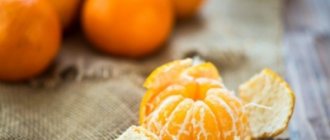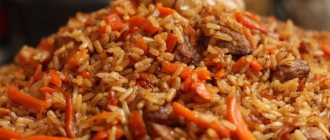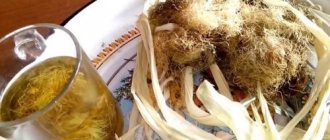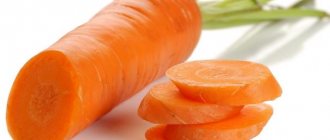Beneficial features
The powder obtained from twisted pieces of cinnamon tree bark not only gives desserts and drinks a pleasant, specific aroma and taste, it brings enormous benefits to our health. The calcium, iron and phosphorus contained in cinnamon, as well as specific tannins and essential oils, have a beneficial complex effect on the body systems:
With regular use of cinnamon, a new mother will be able to significantly strengthen her body’s defenses and support the functioning of the gastrointestinal tract. It is also believed that drinks with this aromatic spice improve lactation. But is cinnamon tree bark safe?
Cinnamon should still be used with caution. The powder contains a specific element - coumarin. When consumed in moderation, it stimulates the defenses and normalizes the functioning of the gastrointestinal tract, but if you get too carried away with the spice, the concentrated content of this substance can negatively affect the functionality of the liver.
Another side effect of excessive consumption of spices is a reduction in smooth muscles. Desserts and baked goods with cinnamon should absolutely not be eaten during pregnancy, since specific substances in its composition cause uterine tone and can contribute to spontaneous abortion or miscarriage.
The potential harm associated with excessive consumption of cinnamon also determines the list of contraindications for this product. You should not eat desserts, baked goods or drink drinks with this spice if:
- epilepsy;
- nervous exhaustion;
- bleeding;
- hypertension;
- liver pathologies;
- stomach ulcer.
You should also avoid spices during periods of complex drug treatment. The active substances contained in the powder can reduce the therapeutic effect of medications taken or lead to side effects.
Cinnamon during breastfeeding
The period of breastfeeding is an important stage in a woman’s life. The period is characterized by a woman’s very responsible attitude regarding the choice of her diet. Sometimes you have to exclude your favorite foods so as not to harm the baby. There are also limitations among seasonings.
Cinnamon is controversial among women, but what should spice lovers do? The main thing is to study in advance the main aspects of use and how cinnamon should be used correctly for breastfeeding.
Benefits of cinnamon
The seasoning has many beneficial properties known to mankind for many centuries.
Today, the spice is used in many areas of cooking. It is important to consider that the benefit of a product for one organism does not mean that it will suit another. Any product must be introduced carefully, gradually, monitoring the baby’s reaction in this case.
Among the beneficial qualities of cinnamon are:
- Helps activate metabolism, leading to the loss of unnecessary pounds.
- The presence of dietary fiber promotes the active removal of harmful salts.
- Regular intake of treats helps strengthen the gastric walls and activates the normal function of the gastrointestinal tract.
- Strengthens the heart, improves the functioning of the circulatory system.
- Cholesterol levels are gradually reduced and the risk of heart attack is prevented.
- A large amount of calcium has undeniable benefits during breastfeeding.
- Known among people as an essential antioxidant.
- Immunity increases.
- Known as a natural antioxidant and antiseptic drug.
- Used for colds, acute respiratory viral infections, and symptoms of influenza.
- Allows you to relieve skin irritations using it as a cream.
- Properties that increase performance, improve well-being and mood.
The benefits of cinnamon are difficult to overestimate; the main thing is to properly introduce it into the diet of breastfeeding women. The spice will help in the right amount to benefit mother and baby.
Is it possible for a nursing mother to have cinnamon?
When asked whether it is possible to take cinnamon during breastfeeding, experts and experienced mothers are unanimous in their opinion. Its use is not prohibited - you can add the aromatic powder to desserts, drinks and baked goods.
To improve lactation, mothers are often recommended to drink drinks with added cinnamon. It is believed that the spice increases the volume of milk and accelerates the rate of its production in the glands. In fact, the spice does not have a direct effect on the lactation process: it contains no elements that could contribute to increased milk production.
To stimulate lactation, it is often suggested to use a special milk drink containing cinnamon, sugar and walnuts. Before trying such a complex drink, a nursing mother should be sure that her baby does not have a food allergy to traces of these products in breast milk.
- a glass of milk;
- cinnamon;
- sugar;
- 10 walnuts.
This aromatic drink is drunk at night, immediately before the last evening feeding, no more than 2 times a week.

Features of introduction into the diet
During breastfeeding, a new mother is allowed to include cinnamon in her diet after the period of colic in the baby ends, that is, for 3-4 months. It is strictly forbidden to make drinks that supposedly stimulate lactation in the first month - traces of active substances from the spice, once in the digestive system of a newborn, will cause severe colic.
First, the spice is carefully introduced into drinks - kefir, milk and tea, then the aromatic powder can be sprinkled on baked apples, and by the time a woman is one year old she can afford to bake.
- For the first time, lightly sprinkle tea or kefir with a pinch of cinnamon. It is better to try the spice in the morning so that you can monitor the manifestations of negative reactions throughout the day and help your baby.
- On the day you consume cinnamon, you should not introduce any other new foods.
- If negative reactions occur (colic in the evening of the first day, rash and changes in stool character in the next 2-3 days), exclude the spice from your diet for 3-4 weeks.
- If your baby has not responded to the new addition to your diet, you can continue to drink cinnamon drinks, but not more than 2 times a week.
By observing moderation in consumption, you can safely diversify your diet with aromatic drinks and desserts with your favorite and healthy spice for your breastfeeding baby.
Since the health of the baby directly depends on what a nursing mother eats, a woman should be responsible in choosing each product for her menu. This also applies to oriental spices: powders packaged in bags cannot be included in your diet; you only need to buy cinnamon sticks.
On the shelves you can most often find two types of cinnamon - Ceylon cinnamon and Chinese cassia (the bark of another variety of cinnamon tree). The latter is more common and is relatively inexpensive, but it also contains quite a lot of coumarin. This substance is a poison and, if consumed excessively, its high concentration in the blood can lead to liver problems.
Ceylon cinnamon, in turn, contains less coumarin. It costs more, but has a pleasant non-burning taste, pronounced aroma and characteristic sweetness.
High-quality cinnamon is a thin inner layer of bark cut from three-year-old shoots of a cinnamon tree. During drying, the pieces are rolled into characteristic tubes, after which they are cut into sticks up to 12 cm long. The production of cassia differs from the methods of extracting quinamon: a cheap and dangerous spice is obtained from the bark of mature trees. The high productivity of the process precisely reduces the cost of the spice.
How to find kinamon? The quality of cinnamon will be indicated by its high cost. Also pay attention to the following points:
Keep purchased cinnamon sticks in an airtight container and protect them from sunlight and dampness. There is no need to immediately grind the spice into powder - this will reduce its shelf life by half. Whole sticks are good for use throughout the year.
Before adding cinnamon to a drink or dessert, break off a small piece from the stick with a dry hand and rub it with your fingers. A high-quality spice will easily crumble into powder.
Fragrant and incredibly healthy cinnamon will add pleasant variety to a new mother’s menu. You can begin to introduce this spice into your diet after the period of colic in your baby ends - it will not harm him at all if you observe rational restraint when consuming the product.
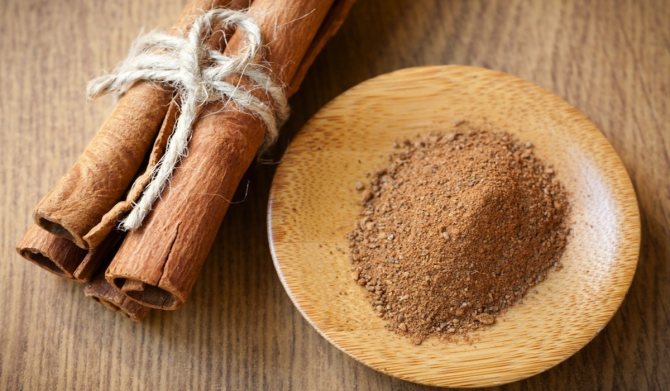
After the birth of a child, women revise their diet, eliminating most previously familiar dishes. Seasonings also fall into this list. After all, some of them can cause irritation to the baby’s digestive tract and worsen the taste of breast milk. In addition, spices are highly allergenic products, which makes their use during lactation impossible. But there are exceptions to every rule. And cinnamon is a good confirmation of this.
Cinnamon during breastfeeding: is it possible for nursing mothers and other features
There is practically no place for spices and herbs in the diet of a nursing mother - they irritate the gastrointestinal tract, can worsen the taste of breast milk and cause an allergic reaction in the baby. But there are some exceptions, including cinnamon.
The sticks and powder are made from the bark of cinnamon trees native to Southeast Asia. The spice contains:
- calcium;
- phosphorus;
- iron;
- tannins;
- essential oils.
The aromatic spice is widely used in cooking and perfumery, and its beneficial properties are in demand in the production of medical and cosmetic products.
Effect of cinnamon during breastfeeding
Cinnamon is a valuable product that helps increase breast milk production. Consumption of spices during lactation helps achieve the following effects:
- Normalize metabolic processes. This helps improve water-salt balance and eliminate excess weight.
- Strengthen the mucous membranes of the stomach and intestines. Consumption of the spice normalizes the functioning of the digestive organs.
- Prevent constipation and intestinal disorders.
- Avoid contracting viral infections. This effect is due to pronounced antiseptic characteristics.
- Renew liver tissue. This result is achieved due to the choleretic effect.
- Activate the immune system.
- Prevent hair loss and stimulate hair growth.
- Cleanse the body of harmful salts.
In moderation, cinnamon will not only not cause harm, but will also be beneficial for the body.
Cinnamon on a nursing mother's menu
You should introduce cinnamon into your diet no earlier than 3-4 weeks after the birth of your child, if the spice was a common product in your diet before pregnancy, and no earlier than 3 months if this is a new seasoning for you. First, you can add a small pinch to tea, compote or kefir, preferably in the morning.
If during the day after drinking this drink your baby does not experience any allergies or food intolerances, you can safely continue to use cinnamon. It is not advisable to use cinnamon daily and in large quantities. It is recommended to limit yourself to 2-3 uses per week.
Cinnamon promotes a speedy return to pre-pregnancy form by helping the body absorb and process sugar.
Product storage rules
When storing cinnamon, certain rules must be followed:
- It is necessary to keep the spice in a glass, hermetically sealed container,
- the place used for storage must be dark, dry and cool,
- ground cinnamon retains its quality for six months, and sticks for one year.
Beneficial properties of cinnamon
The spice has a complex effect on the body:
Source: https://kcdc.ru/zabolevaniya/mozhno-li-koricu-pri-gv.html
Fragrant cinnamon: origin, beneficial and harmful qualities
Cinnamon is obtained by cutting the inner thin layer from the bark of trees of the same name (cinnamon, or Ceylon cinnamon), growing in India and on the island of Sri Lanka. You can find this fragrant spice on the shelves in the form of tubes or powder. It has a golden brown color and a slightly sweet aroma. The seasoning is used in baking, canning, seasoning meat and fish dishes, is used in making chocolate, and added to tea and coffee.

Cinnamon is obtained from the bark cut from the tree.
It is important to know that in addition to the real Ceylon variety of cinnamon, there is also a similar plant variety - cassia, or Indonesian cinnamon. The seasoning obtained from its bark has a toxic composition (due to coumarin); if consumed in large quantities, it can cause headaches, liver disorders, and hepatitis. In order not to confuse these varieties, you need to carefully study their external differences. Cassia bark has a dark red-brown color and a dense structure. The aroma is weakly expressed, the burning and pungent taste is enhanced. The cinnamon tube, on the contrary, is thin and fragile, light brown or yellow-brown in color, and has a refined and mild aroma.
The composition of cinnamon is impressive. Seasoning contains:
- tannins,
- essential oil,
- a number of vitamins (such as A, B, K, C, E and PP),
- sodium,
- potassium,
- magnesium,
- calcium,
- manganese,
- zinc,
- iron,
- selenium.
Cinnamon has beneficial properties for most human vital organs, it:
- improves brain functionality, increases memory and alertness;
- improves the activity of the central nervous system, indispensable for stress and depression;
- helps strengthen the immune system, protects against bacteria, fungi, viruses and parasites;
- has antipyretic and anti-inflammatory properties;
- expels excess water and salt deposits from the body due to the diaphoretic and diuretic effect;
- used for the prevention of malignant tumors;
- relieves spasms in the stomach and irritation in the intestines, eliminates bloating;
- has a beneficial effect on the condition of tooth enamel, protects against caries, reduces bleeding gums;
- reduces cholesterol in the blood, normalizes the functioning of the heart muscle;
- enhances hair growth, helps in the fight against skin diseases (eczema, acne);
- helps normalize blood pressure;
- used for diabetes - lowers blood glucose levels, stimulates insulin production.
In addition, cinnamon essential oil is used as a medicine. Ceylon cinnamon is chosen for these purposes because it contains the most beneficial substances. Used to treat colds and viral diseases. Cinnamon oil is also added to anti-arthritis ointments, as it has a pronounced warming effect.
If we talk about the dangers of the cinnamon plant, the negative consequences here are directly related to the amount of its consumption:
- in stressful conditions, a large amount of seasoning eaten does not relieve tension from the nervous system, but increases it. Therefore, it is important to use no more than one teaspoon per day of this substance;
- excessive consumption of cinnamon causes irritation of the stomach walls and aggravates gastritis (due to its pronounced burning property);
- during pregnancy, the spice provokes uterine contractions;
- if you have individual intolerance or low blood clotting, you should also refrain from using cinnamon;
- For diseases of the liver, kidneys and urinary tract, the spice should be consumed sparingly.
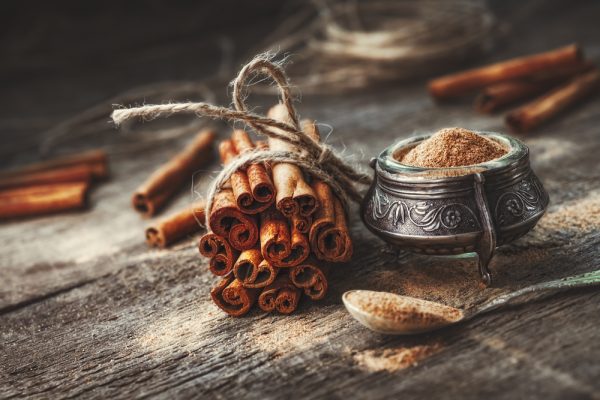
Cinnamon will only be beneficial if consumed in moderation.
The energy value of cinnamon per 100 g of product ranges from 247 to 261 kcal. It contains more carbohydrates than proteins and fats. It is worth considering that since the spice is used in small quantities, the calories consumed are very small.
Is it possible to have cinnamon while breastfeeding?
Almost all spices are prohibited during breastfeeding, as they can negatively affect the taste of breast milk, cause gastrointestinal irritation, and cause allergies. Are there exceptions to this rule? Yes, I have. Cinnamon is acceptable during breastfeeding. How is it useful for mother and baby? How and in what quantities can it be consumed?
Benefits of cinnamon during breastfeeding
Cinnamon is a completely natural product. It is made from the bark of special cinnamon trees that grow in Southeast Asia. Its composition is quite rich in valuable substances:
- Essential oils.
- Tannins.
- Minerals (iron, calcium, phosphorus).
The aromatic spice has many beneficial properties that will benefit a nursing mother:
- Lowers blood glucose levels, which is useful for those women who have problems with high sugar, for example, due to gestational diabetes during pregnancy.
- The spice has a positive effect on metabolism, speeding it up and allowing you to quickly lose extra pounds after childbirth.
- Antiseptic properties help the body fight various types of infections and inflammations.
- The spice is often added to medications against colds, as it helps fight them.
- Cinnamon stimulates the gastrointestinal tract, strengthens the walls of the stomach and intestines.
- Cinnamon powder is an excellent choleretic agent and has a beneficial effect on the renewal of liver cells.
- Regular consumption of the spice will help get rid of high cholesterol and improve blood circulation.
- Many nursing mothers note that the spice added to tea helps to establish and maintain sufficient lactation.
- All beneficial properties affect not only the mother, but also the baby, since the valuable substances contained in the spice penetrate into breast milk and enrich it.
You can and should use cinnamon during breastfeeding. But you should be aware of some risks that may arise if you overuse this wonderful seasoning.
Possible harm of cinnamon during breastfeeding
The first thing worth noting is individual intolerance to the product. Even if the mother ate food seasoned with cinnamon, during pregnancy there cannot be complete confidence that the baby will tolerate this product well. Allergic reactions, although rare, do occur. Therefore, you need to introduce spice into your diet carefully and carefully.
Another risk may be the baby’s refusal to breastfeed. Cinnamon is a very aromatic seasoning. If you eat too much of it, it can affect the taste of breast milk, which is unlikely to please your baby.
There are also a number of contraindications for which it is undesirable to use cinnamon:
- Pregnancy. In large quantities, the spice can cause contractions of the uterus, which leads to termination of pregnancy.
- Liver diseases. The fact is that the spice contains coumarin, a substance that can negatively affect the liver if its concentration in the body exceeds the permissible limit.
To avoid negative reactions, you need to buy high-quality Ceylon cinnamon, and not the cheap Chinese equivalent. Ceylon quinamon has significantly lower coumarin content than Chinese cassia
How to properly use cinnamon during breastfeeding
If you follow several rules for consuming cinnamon, the risks for mother and baby will be minimal, and the benefits will be very noticeable.
We recommend reading: Is it possible for a nursing mother to eat dill?
- You need to purchase spices only of the highest quality from trusted retail outlets.
- It should be introduced into the diet starting with small doses and not earlier than 3 months of the baby’s life.
- If the baby is prone to allergic reactions, then it is better to wait with the use of cinnamon until he is 5-6 months old.
- The first time, just add a small pinch of spice to the tea. If the baby does not have a negative reaction, then you can slightly increase the dose, but not exceed 2 g per day.
- You don’t need to eat dishes with this spice every day, 2-3 times a week is enough for the body to get everything it needs.
- It is best to eat cinnamon in its pure form, adding it to drinks or sprinkling it on apple slices, for example. Unfortunately, when used in sweet pies and buns, the beneficial properties of this spice will be negated by the main product - butter dough.
To increase lactation, you can prepare the following drink: add a pinch of cinnamon, a tablespoon of ground walnuts, a spoonful of sugar to milk (250 ml) and simmer thoroughly over heat (15-20 minutes).
It is very important that the drink simmers, that is, the fire should be such that the mixture does not boil. Cool the finished drink until warm and drink before night feeding.
For the effect to be noticeable, you need to prepare and drink this milk at least 1-2 times a week.
Nursing mothers need to carefully select products for their menu. Cinnamon can be an excellent addition that diversifies the taste of familiar dishes and drinks. The main thing is to maintain a sense of proportion and focus on the baby’s well-being.
Source: https://floragaz.ru/mamam/mozhno-koricu-grudnom-vskarmlivanii
Effect of cinnamon during breastfeeding
For a long time, cinnamon has been famous for its ability to increase the volume of breast milk.
In addition, cinnamon can bring many more benefits to a nursing mother and her baby, it:
- normalizes metabolism, thereby improving water-salt balance and losing extra pounds;
- strengthens the mucous membrane of the stomach and intestinal walls, improves the functioning of the gastrointestinal tract;
- good for preventing constipation and intestinal disorders;
- thanks to its pronounced antiseptic properties, it protects not only the mother, but also the baby from colds;
- helps renew tissue in the liver due to its choleretic effect;
- has an immunostimulating effect;
- prevents hair loss and stimulates its growth;
- due to the calcium content (1002.0 mg per 100 g of product), it flushes out harmful salt accumulations and supports the body of a nursing mother.
But there are cases when it is better for nursing mothers to refrain from consuming cinnamon:
- with heavy bleeding after childbirth, since the seasoning dilates blood vessels and stimulates strong uterine contractions;
- in case of individual intolerance in the mother and allergies in the baby;
- for liver diseases (due to the coumarin contained in the composition). This is especially true for Chinese cassia. Indeed, unlike real cinnamon (coumarin content is 0.02 mg per 100 g of product), it contains up to 2 mg of this substance per 100 g of product.
You should always remember that if you consume the spice in large quantities, the taste of breast milk will deteriorate.
Is it possible to use cinnamon while breastfeeding? Does it affect lactation?
09/26/2017. Article updated: January 2, 2020.
Most spices are prohibited during breastfeeding, but there are exceptions. Like, for example, such an oriental spice as cinnamon - the dried bark of evergreen trees from the genus Cinnamon.
depositphotos.com. domnitsky.yar.
Why is it useful?
Cinnamon affects the body of a nursing mother on several fronts at once:
- For slimness. Promotes the conversion of glucose into energy rather than into fat deposits. Tea or herbal decoction with this spice will help you get back into shape faster after childbirth.
- Reduces blood sugar levels. Recommended for diabetics, especially in combination with kefir.
- Antiseptic. Helps the body fight viral infections and fungal diseases.
- Strengthens the immune system, prevents and treats colds. Cinnamon is included in some antiviral drugs; helps cope with acute respiratory infections, flu and other seasonal diseases.
- Stimulates the functioning of the gastrointestinal tract. It has a beneficial effect on the functioning of the digestive system, relieves gas formation, diarrhea and constipation.
- Good for the kidneys, removes excess fluid.
- Gives a good mood. It has a pleasant aroma that charges you with vigor and energy.
Substances that enter the mother’s body through food also affect the baby through breast milk.
Recipe for colds
- Take 0.5 tsp. pharmaceutical chamomile, 0.5 tsp. cinnamon, ¼ tsp. anise
- Stir and let it brew in 1 liter of hot boiled water.
- Take before bed.
The drink has an anti-cold and calming effect, helps reduce fever without the use of medications.
Precautionary measures
Contraindications include:
- The baby has allergies. Appears in some especially sensitive children.
- If the next pregnancy occurs during lactation, cinnamon should not be consumed. It causes the uterus to contract, which can cause premature birth.
- Liver diseases. The spice contains coumarin, a potent substance that, if exceeded, can negatively affect the functioning of the main organ of the hepatobiliary system (HBS).
- Poor blood clotting. Cinnamon has blood thinning properties, which is especially dangerous during the postpartum period (6-8 weeks). Therefore, women who have problems with blood clotting are better off not taking risks.
- High blood pressure. Although cinnamon is praised for its ability to lower blood pressure, it is contraindicated for people with frequent episodes of hypertension.
- Stomach ulcers and other gastrointestinal pathologies associated with low acidity.
- Drug treatment. Biologically active substances in spices change the effect of medications: either reduce their effectiveness or cause side effects.
Attention! In some women, excessive consumption of cinnamon can cause headaches and apathy, and provoke the appearance of swelling and skin rashes.
Cinnamon and lactation
When consumed in excess, cinnamon changes the habitual taste of human milk for a baby. But in reasonable quantities, for example, as part of healthy drinks, the spice supports lactation.
Recipe to improve milk production
- Mix 1 tsp. cinnamon and milk with 2 tsp. Sahara.
- Pour a glass of milk into a small saucepan and add a handful of chopped walnuts.
- Place on the stove and keep for 15–20 minutes, without allowing the mixture to boil.
- Add the prepared cinnamon and sugar mixture and mix thoroughly.
- Cook for about 5 minutes more.
Take before bed, but no more than 1-2 times a week.
Enter into the menu
Cinnamon should be introduced into the diet of a nursing mother carefully and not in the first month after childbirth.
- They start no earlier than after 4 months - it is still an allergen that can harm the baby’s fragile body.
- Try adding a pinch to tea, compote, fermented milk products and monitor your child’s reaction. Allow yourself a cinnamon bun, but no more than once a week, as flour is bad for your figure. But kefir with cinnamon, on the contrary, will help in the fight against excess weight.
- Use the spice in the morning and monitor the baby’s condition throughout the day.
Apples with cinnamon
Cinnamon in combination with apples will be especially useful for a nursing mother. It is better to give preference not to baked goods, but to baked fruits or drinks with added spice.
- You will need 1 liter of clean water, a fresh apple, 1 cinnamon stick or 1 tbsp. l. cinnamon powder.
- Finely chop the fruit, sprinkle with chopped spices, cover with cold water and place in the refrigerator for 2 hours.
- Strain the cooled liquid and drink throughout the day instead of tea or coffee.
The drink will help you lose weight, improve digestion and strengthen your immune system. But there is also a drawback - the high acidity of fresh apples. Therefore, follow the norm.
Herb tea
Tea flavored with cinnamon acquires a rich aroma and pleasant spice. In combination with properly selected and approved herbs for lactation, it will promote weight loss and increase milk flow in a nursing mother.
Acceptable herbs during breastfeeding: mint, anise, fennel, chamomile and some others.
Cosmetic bonuses
The female body, exhausted during pregnancy, childbirth and breastfeeding, needs additional support. The condition of the skin, nails and hair worsens.
Homemade cosmetics recipes with cinnamon can:
- increase skin turgor;
- return the blooming color to your face;
- remove pimples and inflammation;
- reduce the appearance of cellulite;
- smooth out small wrinkles;
- accelerate hair growth;
- lighten curls;
- get rid of papillomas and warts;
- suppress the activity of skin fungus;
- speed up the resorption of bruises and stretch marks.
A young mother does not have time to implement complex beauty recipes. Therefore, only the simplest ones are popular.
Mask for the face
Cosmetologists claim that it improves mood, provides rejuvenating, nourishing, anti-inflammatory and moisturizing effects.
- Mix 1 tbsp. l. honey and 0.5 tsp. cinnamon.
- Apply to face for 15–20 minutes.
- Rinse off with warm water.
Hair growth mask
The effect of cinnamon components is enhanced by other nourishing ingredients that stimulate hair growth.
- Take 2 tbsp. l. high-quality olive oil without impurities, the same amount of kefir, beat with 1 raw egg, add 1 tsp. cinnamon powder and honey.
- Apply to clean, slightly damp hair for a quarter of an hour.
- Rinse your hair thoroughly.
Ginger or cinnamon – which is better?
Ginger will also be useful when breastfeeding: it strengthens the immune system, helps the mother get rid of stress and excess fat. But it more often causes allergies in the baby than cinnamon. In large doses, it is dangerous for the child’s nervous system and negatively affects his overall well-being.
Therefore, ginger is introduced into the menu of a nursing mother a little later - after 6 months.
It is advisable to consume cinnamon no more than twice a week, and no more than once as part of flour products.
Is cinnamon allowed during breastfeeding, and from what month? Link to main publication
Source: https://PitanieDetok.ru/grudnoe/korica-gv.html
When and how to introduce it into the diet of a nursing mother
Cinnamon is a highly allergenic food. Therefore, the seasoning should be used with great caution when breastfeeding. An allergy can manifest itself with the following symptoms:
- runny nose and nasal congestion;
- tearing and redness of the eyes;
- skin rash;
- nausea, vomiting, diarrhea;
- swelling of the throat, lips and tongue.
Thus, in the first months after the birth of the baby, it is better to refrain from consuming cinnamon and wait until the baby’s body is strong enough. It is better to include such a product in the menu in the third or even fourth month after birth.
It is advisable to buy cinnamon in the form of sticks, and not in a ground state. Although the price of such a product is quite significant, the quality will also be at the highest level. Accordingly, the risk of harm will be minimized.
The first time you need to try cinnamon in a very small amount - on the tip of a knife. It is best to do this in the first half of the day, so that you can then monitor the baby’s reaction to the product. If there are no negative results, the dosage can be gradually increased. It is important to remember that during lactation you should consume no more than 2 g of cinnamon per day and two to three times a week, so as not to spoil the taste of breast milk.
If a child is allergic to a seasoning, its introduction into the diet should be delayed until the baby is six months old. And then try the cinnamon again in small portions.
You can add seasoning to tea, dairy products, compote. Or brew cinnamon sticks in one glass of boiling water and consume in small sips after meals. This drink helps not only to improve lactation, but also to restore strength and energy after childbirth. You can also use cinnamon to sprinkle baked apples. Spice in bread and other baked goods is deprived of its positive qualities, since they are neutralized by butter flour. It is recommended to eat such foods no more than once a week during lactation.
Cinnamon has long been famous for its beneficial qualities and healing properties. This spice is not prohibited during breastfeeding. With moderate use, the immunity of both women and children is strengthened. Cinnamon increases the flow of breast milk, improves mood and energizes. The main thing is to carefully observe the baby’s reaction and remember about his health.
The period of breastfeeding requires a woman to pay close attention to her diet. At this time, you have to give up many foods that can harm the child. There are also restrictions on spices. Cinnamon is a rather controversial product. However, many doctors allow the use of this spice in small quantities.
Compatibility with lactation
Cinnamon, penetrating into breast milk, enters the child’s body with it. In itself, it is not a dangerous product for children.
- A spice can harm a baby only if he or she has an individual intolerance to the spice. In this case, an allergic reaction may occur. For this reason, seasoning should be introduced into the diet of a nursing mother gradually, while constantly monitoring the child’s condition.
- If the baby reacts negatively to the use of the spice, then the mother should give it up for a while, and then you can try again using it in very small quantities.
- It is best to consume tea or products with cinnamon in the first half of the day in order to be able to monitor the baby’s reaction to the introduction of a new product into the mother’s diet.
- It should be understood that too much spice in a mother’s diet leads to a change in the taste of breast milk, which is why the baby will be very reluctant to eat, or may even refuse to eat.
Read also:
Can a nursing mother eat corn sticks?
For the first time, the spice can be added to drinks, for example, tea, compote or kefir.
Even in the absence of a negative reaction to the seasoning on the part of the child, it is advisable to use it no more than twice a week. And cinnamon rolls, to which it is usually added in significant quantities, are best eaten no more than once a week.
Doctors recommend starting to add seasoning to the food of a nursing mother, starting from about the third to fourth month of breastfeeding.
It is believed that cinnamon stimulates the production of breast milk, but it causes increased contractions of the uterus, so you should not get carried away with this seasoning.
Effect of cinnamon during breastfeeding
Cinnamon is a valuable product that helps increase breast milk production. Consumption of spices during lactation helps achieve the following effects:
- Normalize metabolic processes. This helps improve water-salt balance and eliminate excess weight.
- Strengthen the mucous membranes of the stomach and intestines. Consumption of the spice normalizes the functioning of the digestive organs.
- Prevent constipation and intestinal disorders.
- Avoid contracting viral infections. This effect is due to pronounced antiseptic characteristics.
- Renew liver tissue. This result is achieved due to the choleretic effect.
- Activate the immune system.
- Prevent hair loss and stimulate hair growth.
- Cleanse the body of harmful salts.
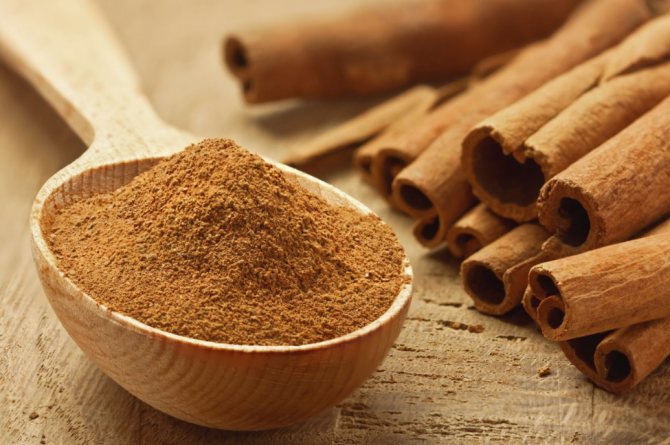
In moderation, cinnamon will not only not cause harm, but will also be beneficial for the body.
The benefits and harms of cinnamon during breastfeeding
The period of breastfeeding is perhaps the most important for a woman. This is the time when you need to carefully monitor your diet, sometimes giving up many of your favorite foods, so as not to harm your baby. But it is not always clear, as in the case of cinnamon when breastfeeding, whether you need to completely exclude it from your diet.
For example, doctors advise increasing the amount of dairy dishes, and completely avoiding fruits and sweets.
Cinnamon during breastfeeding
The most important thing to remember during breastfeeding is that everything should be in moderation. In moderate quantities, cinnamon will not only not cause harm, but will also be beneficial for the body because:
- this spice is an excellent helper in the fight against extra pounds, which is especially important for women after childbirth. Therefore, you can safely drink cinnamon tea without fear of harming your baby;
- thanks to its antiseptic properties, the spice will help overcome viral infections and fungi, as well as strengthen the immunity of mother and infant (also read the article: Vitamins for nursing mothers>>>);
- cinnamon stimulates the gastrointestinal tract, strengthening the walls of the stomach;
- improves blood circulation and helps significantly reduce blood sugar levels;
- Considering that cinnamon is included in many medications designed to fight various colds, consuming the spice will help in treatment.
Such a number of beneficial properties of the spice makes it possible to positively resolve the question of whether a nursing mother can take cinnamon.
Tips for proper use of spices
Despite the obvious benefits for the body, cinnamon during breastfeeding, like any other product, can cause a baby’s allergies. To prevent this from happening, you need to follow simple rules:
- Do not introduce the spice into the diet before the fourth month of a child’s life;
- Add cinnamon to tea or kefir for the first time in the morning to monitor your baby’s reaction;
- At the slightest sign of an allergy or problems with the gastrointestinal tract in a child, immediately discard the product;
- Keep it in moderation, do not consume the spice more than 2 times a week with tea and no more than 1 time with baked goods. Current article: Can a nursing mother have bread?>>>.
If you take these features into account, the risk of negative consequences from consuming cinnamon while breastfeeding is minimal.
What harm can spice cause?
Most often, harm from cinnamon during breastfeeding occurs from excessive consumption of the spice. It’s not for nothing that they say that everything is good in moderation. If you abuse this spice, you risk:
- cause severe irritation of the stomach walls;
- negatively affect the liver or kidneys;
- cause too strong contractions of the uterus.
Well, for an infant there can be only one harm from cinnamon - an allergic reaction. But given that this product is not a strong allergen, the risk of negative consequences is minimal, and the benefits are obvious.
Also, be sure to watch the course Safe Nutrition for a Breastfeeding Mother>>>
Drink to improve lactation
Hot drinks are good for promoting milk flow, but you shouldn’t use this as a way to increase lactation. The amount of milk depends on your compliance with the basic rules of breastfeeding.
Here's a drink you can make using cinnamon.
You will need:
Cooking process:
- Pour the cinnamon into a deep bowl, add one tbsp. a spoonful of milk, stir until a homogeneous mass is formed;
- Crush the nuts, add them to the rest of the milk and place on the stove for 20 minutes (low heat). Make sure that the milk does not boil by periodically setting the bowl aside;
- Add cinnamon and sugar and cook for another 5 minutes, stirring constantly.
Another undoubted advantage of the spice is that it is added to confectionery products. Can a nursing mother have cinnamon rolls? If you really want something sweet, of course yes! Moreover, this is an excellent way out of the situation.
After all, chocolate, soda and other gastronomic delights are strictly prohibited, and baking with your favorite spice promotes the release of endorphins, which are also called joy hormones and are responsible for a good mood. Find out in what quantities chocolate can a nursing mother eat?>>>. And your positive attitude will only benefit your infant, who perfectly senses the slightest shade of your emotions.
But at the same time, remember about your figure. After all, the extra pounds that appear after childbirth will not go away immediately, and overuse of baking can lead to them staying with you forever. Even if it's gingerbread or a cinnamon bun that helps you lose weight. It is better to often give preference to tea or kefir with the addition of this healthy spice.
Thus, if you are a nursing mother, do not forget that cinnamon is good only in moderation, there is no need to overuse any spices. Monitor the condition of your infant, and if the product does not cause allergic reactions, enjoy it without forgetting about caution.
Source: https://uroki4mam.ru/koritsa-pri-grudnom-vskarmlivanii
Drink to improve lactation
Warm drinks provide a flow of milk. To stimulate lactation, you can make an effective remedy from the following components:
- 200 ml milk;
- 1 small spoon of cinnamon;
- 2 small spoons of sugar;
- 10 pieces of walnuts.
To make a healing drink, you need to do the following:
- Place the cinnamon in a deep container, pour in 1 spoon of milk and mix thoroughly.
- Mix the chopped nuts with the remaining milk. Place on low heat and cook for 20 minutes.
- You need to make sure that the liquid does not boil.
- Add cinnamon and sugar and cook for another 5 minutes. The mixture should be stirred all the time.
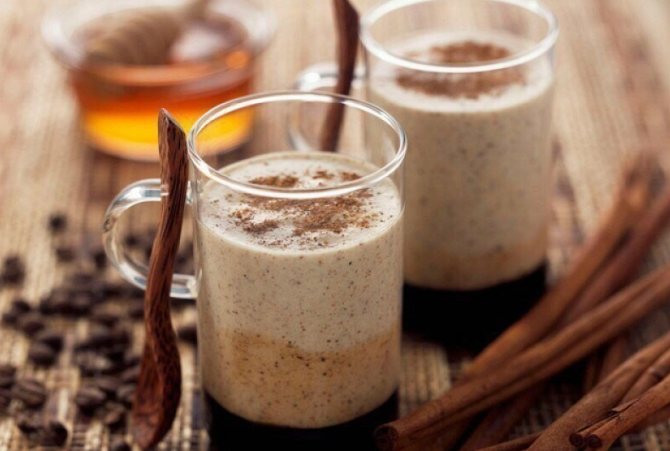
To stimulate lactation, you can use the spice for baking. If you want to treat yourself to something tasty, a cinnamon roll is perfect.
Beneficial properties of cinnamon
The spice has a complex effect on the body:
- improves brain functions;
- restores the functioning of the nervous system, helps cope with stress and depression;
- strengthens the immune system, provides protection against bacterial microorganisms, worms, viruses;
- reduces temperature and relieves inflammation;
- cleanses the body of excess fluid and salts;
- used to prevent the formation of malignant tumors;
- copes with spasms of the digestive organs;
- has a beneficial effect on the condition of tooth enamel, provides protection against caries, eliminates
- bleeding gums;
- reduces cholesterol, restores heart function;
- normalizes blood pressure parameters;
- lowers blood sugar levels and activates insulin synthesis.
When and how to introduce it into the diet of a nursing mother
Cinnamon is an allergenic product. Therefore, you should not use this spice immediately after giving birth. Then the spice should be gradually introduced into the diet. It is better to give preference to cinnamon in the form of sticks rather than powder.
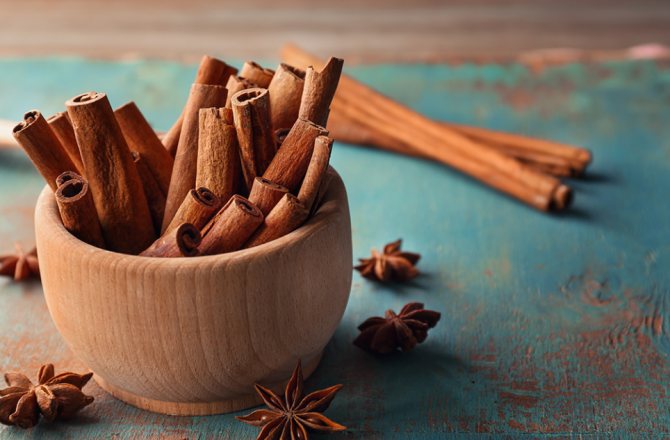
Cinnamon sticks
For the first time, you should try just a little spice - literally on the tip of a knife. If there are no negative reactions, the amount is gradually increased. Subsequently, you are allowed to eat no more than 2 g of product per day.
Compatibility of cinnamon with lactation
If the child is not allergic, it is allowed to use cinnamon during lactation. It can be added to various drinks - tea, kefir or coffee. Even in the absence of side effects, the dosage of the spice cannot be increased.
You can eat baked goods with spices no more than once a week.
Adverse reactions can only appear if the components are intolerant. They manifest themselves in the form of allergies. In such a situation, you will have to refuse to use the spice. Excess cinnamon causes a change in the taste of milk. As a result, the baby may refuse to breastfeed. Therefore, doctors advise remembering a sense of proportion.

If you are a nursing mother, do not forget that cinnamon is good only in moderation, there is no need to overuse any spices
Cinnamon during breastfeeding – can it be consumed or not?
The period of breastfeeding requires a woman to pay close attention to her diet. At this time, you have to give up many foods that can harm the child. There are also restrictions on spices. Cinnamon is a rather controversial product. However, many doctors allow the use of this spice in small quantities.
When and how to introduce it into the diet of a nursing mother
Cinnamon is an allergenic product. Therefore, you should not use this spice immediately after giving birth. Then the spice should be gradually introduced into the diet. It is better to give preference to cinnamon in the form of sticks rather than powder.
Cinnamon sticks
For the first time, you should try just a little spice - literally on the tip of a knife. If there are no negative reactions, the amount is gradually increased. Subsequently, you are allowed to eat no more than 2 g of product per day.
Compatibility of cinnamon with lactation
If the child is not allergic, it is allowed to use cinnamon during lactation. It can be added to various drinks - tea, kefir or coffee. Even in the absence of side effects, the dosage of the spice cannot be increased.
You can eat baked goods with spices no more than once a week.
Adverse reactions can only appear if the components are intolerant. They manifest themselves in the form of allergies. In such a situation, you will have to refuse to use the spice. Excess cinnamon causes a change in the taste of milk. As a result, the baby may refuse to breastfeed. Therefore, doctors advise remembering a sense of proportion.
If you are a nursing mother, do not forget that cinnamon is good only in moderation, there is no need to overuse any spices
Recipe for a drink during lactation
To benefit from cinnamon, you can prepare the following drinks with its addition:
- kefir;
- Herb tea;
- milk;
- milk with nuts and sugar.
Cinnamon can be consumed while breastfeeding. But this must be done carefully, strictly observing the dosage. This will help avoid side effects.
You may also like
Source: https://agronom.guru/koritsa-pri-grudnom-vskarmlivanii
